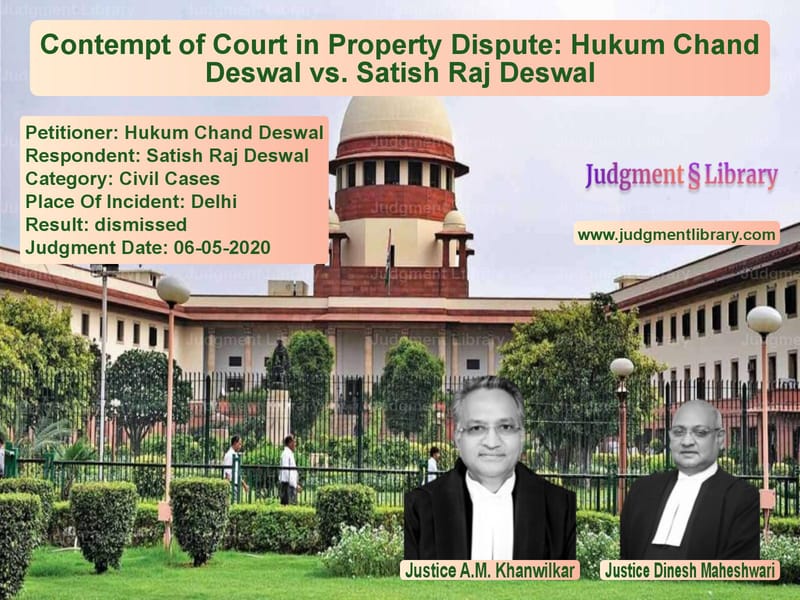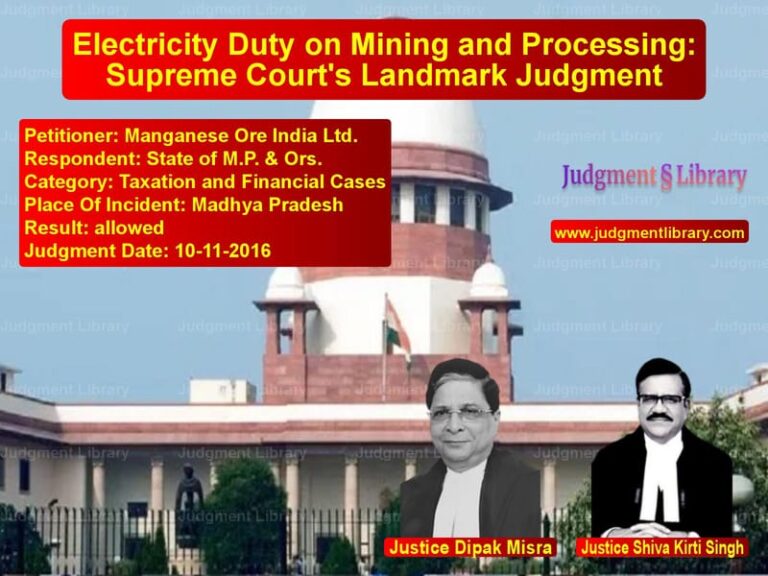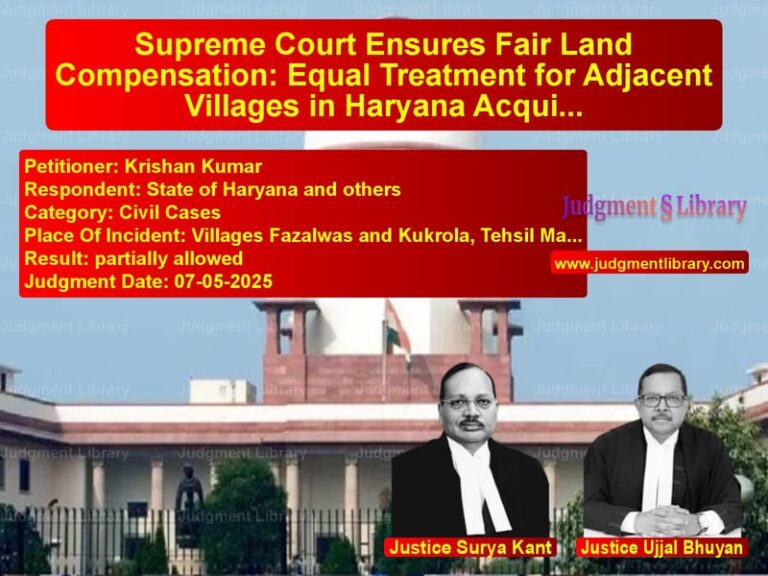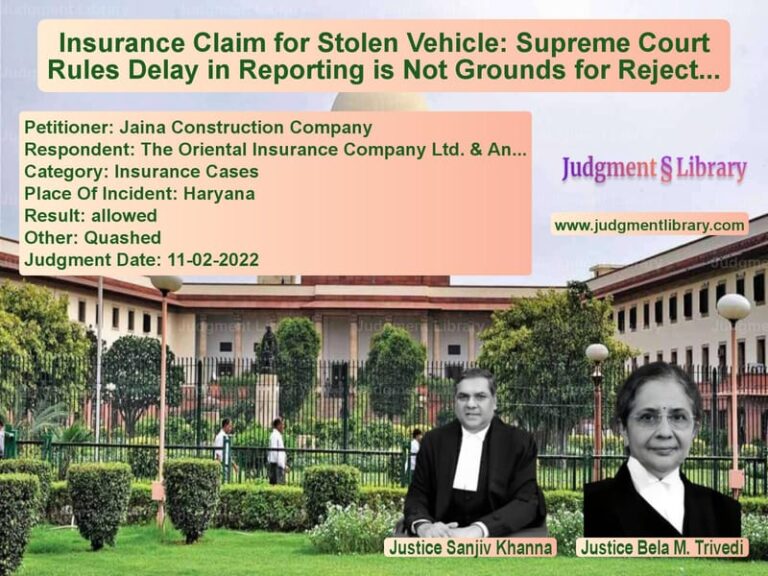Contempt of Court in Property Dispute: Hukum Chand Deswal vs. Satish Raj Deswal
The case of Hukum Chand Deswal vs. Satish Raj Deswal involves contempt proceedings arising from a property dispute between the parties. The Supreme Court was called upon to determine whether the respondent had willfully disobeyed its orders regarding vacating a property and clearing outstanding dues.
Background of the Case
The dispute originated from a civil suit filed in the Delhi High Court concerning property ownership and lease agreements between the parties. The petitioner, Hukum Chand Deswal, had leased out property to the respondent, Satish Raj Deswal, under a rental agreement. A legal dispute arose over the lease terms and the use of a trademark associated with the property.
During litigation, the parties reached a settlement agreement on May 28, 2015, which included conditions regarding vacating the property, rental payments, and discontinuation of trademark usage. The respondent agreed to vacate the property by December 31, 2017. However, the respondent failed to vacate on time, leading to further legal actions.
The dispute escalated to the Supreme Court, which on February 22, 2019, directed the respondent to vacate the property within four weeks while clearing outstanding dues and submitting an undertaking. The petitioner later filed a contempt petition, alleging non-compliance.
Key Issues
- Did the respondent fail to file the required undertaking?
- Were the outstanding dues cleared before vacating the property?
- Did the respondent cause damage to the property before handing it over?
- Should contempt proceedings be initiated for non-compliance with the Supreme Court’s order?
Arguments of the Petitioner (Hukum Chand Deswal)
The petitioner contended that:
- The respondent failed to file an undertaking within the stipulated time, as required by the Supreme Court.
- The respondent did not clear outstanding dues amounting to ₹1,32,48,794 before vacating the property.
- The respondent caused damage to the property while vacating, which was an act of deliberate disobedience.
- These actions amounted to willful contempt of the Supreme Court’s order.
Arguments of the Respondent (Satish Raj Deswal)
The respondent countered that:
- There was no willful disobedience as he had vacated the property within the specified period.
- The issue of outstanding dues was subject to dispute, and it should be determined through execution proceedings.
- The petitioner had continued to use the disputed trademark, causing financial loss to the respondent.
- The damage alleged by the petitioner was misrepresented, as only removable fixtures were taken away.
- An amount of ₹1.5 crores was deposited with the court to demonstrate good faith.
Supreme Court’s Judgment
The Supreme Court analyzed the contentions and ruled as follows:
1. No Contempt for Non-Filing of Undertaking
The Court held that while the respondent had not filed the undertaking as directed, he had vacated the property on time. Therefore, non-filing of the undertaking did not amount to contempt.
“The undertaking was required only if the respondent wanted to avail the extension granted by this Court. Since the respondent vacated the premises on time, the requirement of an undertaking does not hold ground for contempt proceedings.”
2. Disputed Outstanding Dues
The Court noted that the issue of outstanding dues was complex and required adjudication in execution proceedings rather than contempt proceedings.
“The determination of outstanding dues is a matter for execution proceedings. Contempt jurisdiction cannot be used to enforce financial claims that require adjudication.”
3. Alleged Property Damage
The Court found that the allegations of property damage were not sufficiently proven. The petitioner’s claim relied on selective photographs, whereas the respondent provided evidence showing that only permitted fixtures were removed.
“There is no conclusive evidence to establish that the respondent caused damage to the property beyond what was contractually permitted.”
4. Deposit of ₹1.5 Crores
The Court noted that the respondent had deposited ₹1.5 crores in court as an interim measure. It directed that ₹87,37,677 be retained for adjudication in execution proceedings, while the excess amount could be refunded.
Final Verdict
The Supreme Court discharged the contempt notice and ruled that:
- No willful disobedience was proven.
- Outstanding dues should be determined through execution proceedings.
- The alleged damage to the property was not a matter for contempt jurisdiction.
- The deposited amount should be adjusted as per the execution court’s findings.
Impact of the Judgment
This ruling has significant implications for contempt law and property disputes:
- It reinforces that contempt proceedings cannot be used as a substitute for execution of financial claims.
- It clarifies that failure to comply with procedural requirements, such as filing an undertaking, does not always amount to contempt.
- It underscores the need for concrete evidence when alleging property damage in legal disputes.
- It ensures that financial claims related to rent and damages are settled through proper legal channels.
Conclusion
The Supreme Court’s judgment in Hukum Chand Deswal vs. Satish Raj Deswal sets a clear precedent for handling contempt cases in property disputes. While it upheld the need for adherence to court orders, it also distinguished between contempt of court and disputes that require separate adjudication. This ruling serves as an important guideline for landlords, tenants, and legal practitioners dealing with property and financial disputes.
Petitioner Name: Hukum Chand Deswal.Respondent Name: Satish Raj Deswal.Judgment By: Justice A.M. Khanwilkar, Justice Dinesh Maheshwari.Place Of Incident: Delhi.Judgment Date: 06-05-2020.
Don’t miss out on the full details! Download the complete judgment in PDF format below and gain valuable insights instantly!
Download Judgment: Hukum Chand Deswal vs Satish Raj Deswal Supreme Court of India Judgment Dated 06-05-2020.pdf
Direct Downlaod Judgment: Direct downlaod this Judgment
See all petitions in Contract Disputes
See all petitions in Property Disputes
See all petitions in Debt Recovery
See all petitions in Damages and Compensation
See all petitions in Contempt Of Court cases
See all petitions in Judgment by A M Khanwilkar
See all petitions in Judgment by Dinesh Maheshwari
See all petitions in dismissed
See all petitions in supreme court of India judgments May 2020
See all petitions in 2020 judgments
See all posts in Civil Cases Category
See all allowed petitions in Civil Cases Category
See all Dismissed petitions in Civil Cases Category
See all partially allowed petitions in Civil Cases Category







